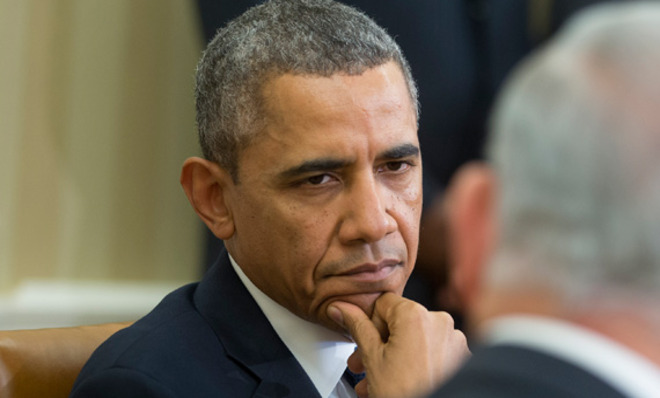America: Don't lose your cool over Russia's Crimean adventure
The Kremlin is acting out of weakness. Our restraint is our strength.


A free daily email with the biggest news stories of the day – and the best features from TheWeek.com
You are now subscribed
Your newsletter sign-up was successful
Russia intervened in the Ukraine, and America's professional mind-losers have lost their minds over it.
Just a few short years after the commentariat supported the abatement of George W. Bush's "cowboy" foreign policy, we're now told that Presisdent Obama needs to be tough on Vladimir Putin. The New Republic's writers are saying, "Mitt Romney was right after all," Putin really is America's greatest geostrategic foe.
There is an odd impotence to the shock and horror. The New York Times editorial board demanded that Obama must "make clear to [Putin] that he has stepped far outside the bounds of civilized behavior, and that this carries a steep price." But in the same sentence it admits that the administration has "few effective levers short of military force, which is not an option."
The Week
Escape your echo chamber. Get the facts behind the news, plus analysis from multiple perspectives.

Sign up for The Week's Free Newsletters
From our morning news briefing to a weekly Good News Newsletter, get the best of The Week delivered directly to your inbox.
From our morning news briefing to a weekly Good News Newsletter, get the best of The Week delivered directly to your inbox.
"Prepare, Vladimir, to feel the might of our few effective levers" is not exactly intimidating.
Even more stupid: The Wall Street Journal partially blamed President Obama for Putin's incursion into the Ukraine, implying that it may be the result of his "failure to enforce his 'red line' in Syria."
Let's try the alternate history the Journal suggests. Does anyone think Russia would see a neighboring allied government overthrown by revolution and squeal, "Heavens, just last year the U.S.A. began wasting more of its military and moral resources in another confusing civil war and nation-building project in the Middle East. We better back off on this Ukraine thing before they invade Lebanon!"
Veteran of Cold War conservatism Pat Buchanan points out that the U.S. practiced a different kind of toughness in a much graver conflict with the Soviet Union, remaining stoic after far worse provocations:
A free daily email with the biggest news stories of the day – and the best features from TheWeek.com
When Red Army tank divisions crushed the Hungarian freedom fighters in 1956, killing 50,000, Eisenhower did not lift a finger. When Khrushchev built the Berlin Wall, JFK went to Berlin and gave a speech. When Warsaw Pact troops crushed the Prague Spring in 1968, LBJ did nothing. When Moscow ordered Gen. Wojciech Jaruzelski to smash Solidarity, Ronald Reagan refused to put Warsaw in default. These presidents saw no vital U.S. interest imperiled in these Soviet actions, however brutal. They sensed that time was on our side in the Cold War. And history has proven them right. [The American Conservative]
Let's have some perspective. Putin may look decisive and bold enough to play skins in world politics. But Russia is acting out of weakness. The breakup of the Soviet Union saw the Kremlin's dominion shrink, and despite promises to the contrary by George H.W. Bush, NATO has expanded closer and closer to Russia's borders.
Having lost important influence over Kiev's government, it has taken a provocative gamble in occupying Crimea. Perhaps Putin wants to make sure that his own interests and the interests of Russian speakers in Ukraine are taken seriously by the new government. Or maybe he has written off that hope and is settling for an annexation to preserve access to the Black Sea, with a dash of intimidation for good measure. Perhaps he simply saw an oncoming regional disaster for his own interests and acted hastily. In that case, Obama should take Jacob Heilbrunn's advice and offer Putin opportunities to back off.
But the political class in America should remember that Moscow is mostly a symbolic foil in world affairs, not a great geostrategic foe. America's political class should stop ducking under its desks and wailing for some kind of symbolic action or rebuke to soothe the nerves. It's unnecessary. The Kremlin used to compete with the free world for entire continents — now it is reduced to an embarrassing grab at Crimea. An aggressive U.S. response over a sliver of Ukraine would not be meeting Putin's strength with our strength, but matching his desperate anxiety with our own.
Michael Brendan Dougherty is senior correspondent at TheWeek.com. He is the founder and editor of The Slurve, a newsletter about baseball. His work has appeared in The New York Times Magazine, ESPN Magazine, Slate and The American Conservative.
-
 The Olympic timekeepers keeping the Games on track
The Olympic timekeepers keeping the Games on trackUnder the Radar Swiss watchmaking giant Omega has been at the finish line of every Olympic Games for nearly 100 years
-
 Will increasing tensions with Iran boil over into war?
Will increasing tensions with Iran boil over into war?Today’s Big Question President Donald Trump has recently been threatening the country
-
 Corruption: The spy sheikh and the president
Corruption: The spy sheikh and the presidentFeature Trump is at the center of another scandal
